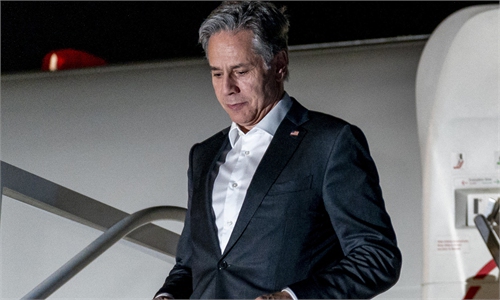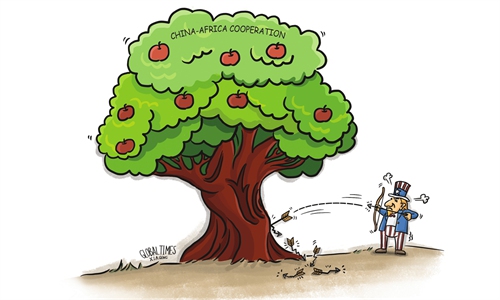Blinken visit a 'diplomatic show,' no help for Africa: scholar

The first phase of the Nairobi-Malaba railway in Kenya built by a Chinese enterprise is officially opened to traffic on October 16, 2019. Photo: VCG
US Secretary of State Antony Blinken is visiting Africa from Sunday to Friday, and he has already visited South Africa and the DRC, before heading to Rwanda. Blinken's visit to the African continent can be seen as the Biden administration's pivot toward Africa. As the US has considered China as a major competitor, it is normal for many in the world to see Blinken's trip as a counter-China political posturing.
While the visit itself has come under the veil of a new US administration keen to portray itself as the champion of cooperation and empowering the African continent, the trip is actually a diplomatic show that brings no benefit to the local communities in Africa and will not address the macroeconomic difficulties that many African countries face.
On the first leg of his African trip, Blinken gave a speech on the US' strategy toward sub-Saharan Africa at the University of Pretoria on Monday. Blinken said that Africa was an "equal partner" that the US wanted to work with and would not "dictate to."
It is undeniable that Blinken's visit was a direct response to Russian Foreign Minister Sergey Lavrov's African tour. The US government's diplomatic mantra has been aggressive and can be very concerning since it alters the global status quo of power stability
The US' new "cold war" mentality in the disguise of global competition is triggering new proxy wars in Europe, like the Ukraine crisis, and global food and energy shortages. It is also fueling a worldwide inflation and anemic growth that is damaging many economies.
To put in perspective, African policymakers will be cautious about Blinken's sudden offer of US cooperation and support, since there is no concrete sum of funds being allocated to support African infrastructure, its economic development, or help deal with its health crisis. The US should not use Africa as a chess piece to pursue its own foreign policy goals, and give African people a break.
Africa is expecting a lot of outside support to facilitate post-COVID19 recovery in all economic and societal fields, from tourism revival, to investing in infrastructure projects like roads and ports, and to increase employability and digital connectivity in the under-developed continent. Also, Africa is going through a food and water supply crisis that calls for outside direct investment to help resolve the difficulties.
Africa 'not take the bait'
China has emerged as the major trading partner of the African continent, with a total transaction volume reaching a staggering$245 billion in goods trade in 2022, dwarfing European and American countries.
The numbers reflect the importance that China policymakers attach on assisting Africa in planning China's global development strategy, typically with the execution of the Belt and Road initiative (BRI) since 2013.
It is interesting to note the resiliency and adaptability of China's investment in African continent and the evolution of the BRI. While it started in 2013 as an infrastructure investment platform to link China to the outside world and help build more infrastructural projects such as the charismatic Ethiopian-Kenyan Railway, now it focuses more on green development and the digital economy, while reducing Africa's trade deficit by increasing imports from the continent.
And this is where the difference rests between China and the West when it comes to truly helping Africa. The BRI represents concrete solutions in investment and trade that help erect regional economic corridors and support local government to access funds to develop their own economies, as long as the projects reflect a win-win solution for all stakeholders.
Against the backdrop, many people like to believe that African nations will not take the American bait, and casually switch sides.
China-Africa engagement has been a highly successful formula when it comes to South-to-South cooperation, as both parties have benefited greatly from this strategic partnership, and at the same time, Africa has found in China a reliable friend, with no colonial history.
Blinken's African trip is unlikely to impact the cooperation under the BRICS mechanism nor would he able to push South Africa to criticize the bloc. South Africa's position with the BRICS is rock solid and based on mutual interest in creating an alternative solution in global governance.
Amid Blinken's Africa trip, US Marine Corps General Michael Langley has assumed command of US Africa Command during a ceremony held at Kelley Barracks in Germany recently. This could also be interpreted as a shift in US military involvement toward Africa.
The new US command is meant to indicate America's re-focus on Africa continent and this can be very dangerous for Africa and African people as the US government might use its military might and security issues to coerce, threaten and pressure African nations, particularly on those small and weak governments on the continent which prefer to be neutral and take their sovereign policy decisions without being held hostage at the gunpoint of Washington.
The article was complied based on an interview with Toumert AI, the honorific secretary general of China Morocco Friendship Association.


